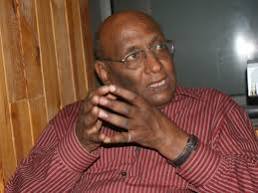Culture and Melee: The Janjaweed born out from Army’s womb (and what else) (2-2)

Abdullah Ali Ibrahim
War is a culture in and outside the battle field, and this is the core of the Sudan war. The meanings of this deadly war are absent from us and from the world because the Sudanese elite are busy with the war of their parties, to the right and the left. The first of this elite war is the mutual accusation about who, not the two armies, started this war. They fought, and are still engaged in it, their war about the war in the field over the media, even though either of them claimed to start the war is above their payment grade, as the English saying goes.
These Elites battles stripped the war of its meaning until it appeared to the world as a fatal conflict between two “generals” hungry for power. The issues that the war challenged the Sudanese existence did not find a place in our elite’s discourse. The positions of alignment against or with one of the two armies (or even neutrality) did not produce knowledge surrounding these challenges with which we could illuminate the darkness. These are challenges to our image of what the modern nation-state looks like, and the professional army in it, which Samuel Huntington said that it is specialized in “managing violence.” These challenges also related to the post-colonial national state and the rotation of power and wealth within it. The regional scope is affected by the deterioration of its environments and the migrations that did not know the “passport” in a famous Sudanese song.
The discourse of the elite circumvented and avoided dealing with the most fundamental issues in the war, such as the status of the army in the modern national state. The FFC does not see in our army what makes it assume the status for managing violence in such a state. FFC has two arguments for stripping the army of its status in Sudan, the first of which is that it is merely a “Kizan militia”, which the Islamists transformed into this capacity during the three-decade rule of the Ignaz. Therefore, no body mourn him who kills himself as the Sudanese saying goes.
And out of the “FFC” insistence that the army is nothing more than a Kizan militia, they say that the “Kizan” were the ones who instructed the army to wage war. “FFC” here confuses the army in politics and the army in profession. Since independence, no Sudanese political group has failed to associate with the army in a government, whether it instructed the army in the coup that brought it to power, or it accompanied the army to rule after its coup. It is known that the Umma Party, which is somewhat “FFC” now, was behind the coup of General Abboud in November 1958, and there is a dispute regarding the issue that we do not want to stop us here.
The communists who pulled out of “FFC” during the discussions of the constitutional revolution document in August 2019, and have an alliance now known as the Radical, were behind the Jaafar Numeiri coup in May 1969, let alone the coup of July 1971. It was not known to the Unionist Party, the Sudanese Congress and the Republicans played “inciting” roles for the coup, but they served under unsuspecting military regimes. The Unionists were linked to the coups d’état of Major General Muhyiddin Ahmed Abdullah in 1959 against Lieutenant General Ibrahim Abboud: the first coup succeeded and the second failed.
As for the Sudanese Congress Party, it is the national political formula for what was historically known among students as the movement of those independent of the “Kizan” and the communists. They were the mainstay of the Numeiri regime in the government, party, press, legislative and trade union councils. They did not abandon it until the fall of the regime in 1985. While the Republicans did not occupy ruling positions in Numeiri’s state, they practiced their education and politics in its dark climate, not worrying about depriving others of what they enjoyed. They provided valuable services to the regime in the meantime until they had a tragic collision with it two years before its fall, not to speak of e coups closely related to parties that did not reach power, such as the bloody Baathist coup in Ramadan 1990.
It is not rational, and the situation is, as we have seen, the army was branded as a Kizani while those who accused it of being “Kizanian” were with it one day and their secret is known. Each of them had his own shift (duty) with the army, and it only happened that the “Kizan” shift was its last one. It is not permissible, as we have seen, to dispose of the army as Kizanian militias. If they did, they would confuse the professional army, which had the ability to manage violence when they were a state, with the professional army, which had its own characteristics that distinguished it from the militias.
As for the other argument, it is of the type of “What you do you may regret one day that you have done it” meaning that the current war of the Army against the “RSF” is its crime against itself because it was the one which delivered the “RSF” from its “womb”, and this is a phrase that is often used in this regard. They consider the war of “RSF” against the army as being like a magic coup against the magician and there is no consolation. Perhaps you do not believe the statement. Journalist Mohammed Latif wrote a focused criticism on it to prove that the army has professionally and strongly distanced itself from association with the “RSF” as it rejected a proposal from ousted President Omer Al-Bashir to recruit a special force under his command. The proposal was not welcomed by the army, which had at that time dismissed another special force affiliated with it, known as the Border Guards, whose performance sparked revolt against it. When the army refused, Al-Bashir transferred the task of forming a special force for the security and intelligence service (ISS). The ISS obeyed the order and formed the special force under the command of Mohammed Hamdan Dagalo, which became the “RSF” of today, but it was unable to meet the cost of the “RSF,” so it sought to return it to the army, but it was rejected.
Al-Bashir was forced to make it a special force directly subordinate to him by a law issued under the National Assembly in 2017. The law does not unite it with the armed forces except in cases of emergency in which every regular force is at the disposal of the armed forces. Perhaps the army could have done more than it did to grasp these militias in the cradle, and perhaps it would have distanced itself from them while they were carrying out their war crimes in Darfur, but to say that “RSF” was born from the womb of the army, “Kizan” and “FFC” are fighting over it. “The Kizan” on their part say that the power that RSF is now enjoying in the political and military arenas, it had in fact obtained it under “FFC” implementation of the transitional government’s orders. They did not deviate from the truth, but with this teasing between “FFC” and “Kizan”, the issue of the professional army that manages violence in the modern state is lost between the two parties.
Anyone who attributes the complete inactivity of mentioning the Sudan war to anything other than invalidating our elite without touching on the alarming challenges facing Sudan is wrong. If the wars that preceded it heralded the dispersion of the country, then this war may herald its destruction. Whenever culture intentionally neglects to embrace its dynamism, chaos becomes apparent and we lose sight of its complex terrain, which, as von Clausewitz said two centuries ago, in the darkest hour, there is a glimmer of an inner light that illuminates the path to truth; either culture or chaos.



